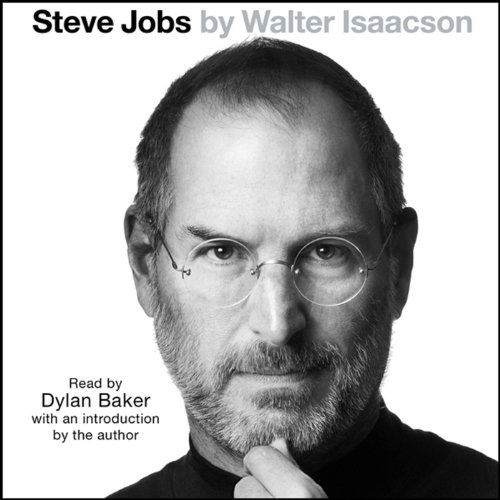Walter Isaacson’s biography of Steve Jobs is in some ways another product created from the mind of its subject. Though Jobs was insistent that he wouldn’t interfere with the writing of the book (and in fact he seems not to have read any part of it), he hand-picked Isaacson to lay down his legacy for all to see. Why he chose him is not surprising: Isaacson’s biographies of Benjamin Franklin and Albert Einstein are engrossing, epic, and readable studies of men who changed history. That Steve Jobs saw himself in this light (and such august company) is neither shocking nor unjustified. And while Isaacson never shies away from Jobs’s often vitriolic temper (and indeed he sometimes seems to dwell on it to make his point), it is clear that in some respects, Steve Jobs is a book told through the often discussed “reality distortion field” of Steve Jobs himself: though other opinions or sides to a story are presented, Steve always has the last, blunt word.
Given the unprecedented access to Jobs and his blessing to interview those close to him presents the reader with a vast and exceedingly complex — but also incredibly consistent — portrait of the man who created Apple and some of the most important technology products of this century. In many ways, the Jobs of the early ’80s at the outset of his breathtaking career is the same feisty and impetuous man we find at the end of the book, picking apart his plans to build a yacht that he knew he would likely never see to completion. Jobs, at least according to this tale, didn’t evolve so much as he forced the world around him to do so. Isaacson’s mastery of the form is evident throughout, and he weaves the tale of Jobs’s life deftly.
For technology enthusiasts and those who followed Steve Jobs’s life as though he were Bob Dylan, the biography reinforces the previously known timeline. Jobs’s own admission early in the process with Isaacson that he didn’t “have any skeletons” in his “closet that can’t be allowed out” is largely true (Isaacson, xx). There are no shocking revelations, but the nuance brought to the events by the wide array of characters Isaacson spent time with, and Jobs’s candid and original perspective, never fail to bring well-known events into sharp and personal focus. One example which was well-documented in the media at the time and which gets several pages of attention in the book is the issue of the iPhone 4′s antenna problems. The story, as told in the book, is significant for a few reasons. First, the book reveals that the band of steel around the edge of the phone was never a big hit with Apple’s engineers, who warned that it could cause reception problems. But Apple’s SVP of Industrial Design Jonathan Ive and Steve Jobs, living deep in the “reality distortion field” which is repeatedly referred to in the book (and which Jobs’s wife more strikingly terms “magical thinking”) insisted that the engineers could figure out how to make it work, to the point that they (Ive and Jobs) even resisted putting a clear coating of varnish on the band to make problems less likely. Secondly, when problems did, in fact, arise, the book makes clear how personally Jobs took the entire situation, going so far as to adamantly suggest that Apple simply ignore the issue, because in his mind, there was no problem, saying, “Fuck this, it’s not worth it” (Isaacson, 521). Only when Tim Cook implored him to face facts did Jobs decide to hold a press conference and offer solutions.
Likewise, it is almost amusing and even a bit sad to read of Jobs’s depression and anger on the evening following the debut of the iPad. Isaacson was by then, somewhat embedded in the Jobs household, and he notes that “as we gathered in his kitchen for dinner, he paced around the table calling up emails and web pages on his iPhone.” Jobs told him, “I got about eight hundred email messages in the last twenty-four hours. Most of them are complaining. There’s no USB cord! There’s no this, no that. Some of them are like, ‘Fuck you, how can you do that?’ I don’t usually write people back, but I replied, ‘Your parents would be so proud of how you turned out.’ And some don’t like the iPad name, and on and on. I kind of got depressed today. It knocks you back a bit” (Isaacon, 495). In this and every previous or future launch, Jobs took the products, and their reception, very personally. In every phase of development, from inception to advertisements, he was a dictator, and, as the book underlines quite clearly, people who reacted badly or were underwhelmed simply didn’t get it. The book is rife with such personal perspectives of what are hallowed occurrences in the timeline of Jobs and Apple.
Jobs’s many achievements are tallied in detail, and while they are well known — the Macintosh, Pixar, the iMac, the iPhone, the iPad — it has only been previously assumed that Jobs was closely involved. Now all of his interactions with Apple’s products are truly exposed, in great, painstaking detail. That Jobs was exhaustively involved from beginning to end in the creation of these products and companies — even during the years in which he was gravely ill — is a testament to his work ethic, his creativity, and his genius. While Steve Jobs never shies away from turning a critical eye on its subject, it rightfully gives much credit to Jobs where it is due. People have long pointed out that Jobs could be an “asshole,” and while the book never outright denies such a description, the sheer volume of his achievements and creations often puts the erratic and childish behavior into soft focus. In fact, the book seems to suggest that Jobs’s fantastic career was born out of his harsh, demanding attitude, rather than in spite of it. “I don’t think I run roughshod over people,” Jobs told Isaacson, “but if something sucks, I tell people to their face. It’s my job to be honest. I know what I’m talking about, and I usually turn out to be right. That’s the culture I tried to create. We are brutally honest with each other, and anyone can tell me they think I am full of shit and I can tell them the same” (Isaacson, 568-569). Rather than exposing Jobs an “asshole,” the biography presents, front to back, a human being who was essentially incapable of being phony, even if doing so would make him appear better to others.
The book also emphasizes, in anecdotes that probably aren’t totally surprising, Jobs’s belief, from the beginning of his career to the end of it, that everything should be (and was if possible), in his control. This meant not just making hardware and software into a closed ecosystem, but also controlling what could be done with the actual products once purchased. The stubborn surety that he knew what was right for himself and everyone else famously resulted in Macs and iPhones which were hard to open up and hack (even adding special screws to the latter to make it more difficult), and in the fact that the iPad wouldn’t display Flash. It also resulted, however, in Jobs stubbornly and often refusing to eat (even when sick), in a belief that being vegan meant he didn’t have to shower, and in a resistance to allow his doctors to remove the cancerous tumor on his colon for nine months in 2003.
Jobs’s managerial style (or lack of one), had been previously well-documented after his ouster from Apple, but the biography is probably at its harshest when describing his various working relationships with other people. We are presented with personal accounts of a well-known volatility that is increasingly shocking, sometimes delusional, and always, in the mind of its subject, justified. One of the true revelations of the book is that Steve Jobs cried — a lot, and in the presence of his co-workers. From the earliest days of his career when he cried to Steve Wozniak’s father Jerry about getting Woz to come work at Apple full time, he broke down in tears regularly when frustrated, when cornered, when happy or touched, and when angry. Though his return to Apple did seem to bring some temperance and evenness to his management efforts, Jobs never stopped openly crying when emotion overwhelmed him.
The sections where Bill Gates — who was sometimes an insider and sometimes not — weighs in, are variously the most touching, sometimes the most interesting, and often do the most to underline the great chasm of difference there was between the two personalities. While Jobs avoids branding him with his favorite and oft-used title “bozo,” Gates, in this tale, truly doesn’t get it a lot of the time, but he gets that he doesn’t get it. On the success of the iPad, Gates tells Isaacson, “Here I am, merely saving the world from malaria and that sort of thing, and Steve is still coming up with amazing new products,” adding, “Maybe I should have stayed in that game” (Isaacson, 553).
Throughout the book, Jobs is incredibly and sometimes amusingly cutting about various friends, former colleagues, business associates, and even celebrities. Many people, in his view (including but not limited to John Mayer, President Obama, Google, and Rupert Murdoch) were constantly “blowing it.” He makes it clear that grudges held could often be permanent. When speaking of Jon Rubinstein, a former Apple executive who helped give birth to the iPod and was then head of Palm, Jobs admits to having emailed Bono, a Palm investor, to complain when the company began trying to make an iPhone competitor. Bono replied that his remarks were akin to “the Beatles ringing up because Herman and the Hermits have taken one of their road crew” (Isaacson, 459). “The fact that they [Palm] completely failed salves that wound,” Jobs says (Isaacson, 460).
Jobs perspective that certain things “sucked” could often be influenced by other factors. For example, it’s hard to tell if Jobs truly thought that Android is “crap,” or if he says it because he was involved in a lengthy battle against Google over patent infringement. What emerges from the Android discussion, however, is that Jobs passionately believed that it was a stolen product. Isaacson was with Jobs the week Apple filed its lawsuit against Google, when Jobs was the “angriest he’d ever seen him.”
“Our lawsuit is saying, ‘Google, you fucking ripped off the iPhone, wholesale ripped us off.’ Grand theft. I will spend my last dying breath if I need to, and I will spend every penny of Apple’s $40 billion in the bank, to right this wrong. I’m going to destroy Android, because it’s a stolen product. I’m willing to go to thermonuclear war on this. They are scared to death, because they know they are guilty. Outside of Search, Google’s products — Android, Google Docs — are shit” (Isaacson, 511-512). In fact, there are few people and companies Jobs sets his sights on who don’t fail to cut the mustard on many levels. Notable exceptions are the Beatles (who Jobs talks about at length in one of the most insightful sections of the book), his wife Laurene, and Jony Ive.
Though none of the Beatles weigh in on Jobs, both Laurene and Ive do, and Ive in particular seems to grapple with Jobs’s personality, telling Isaacson “He’s a very, very sensitive guy. That’s one of the things that make his antisocial behavior, his rudeness, so unconscionable” (Isaacson, 462). Ive is significant to the book in other ways, as Jobs’s main creative brother-in-arms, and, as the story progresses, it is clear that both men struggled with the idea of a post-Jobs Apple. For nearly the entire latter half of the book, and much of Jobs’s “phase two” at Apple, his health was a near constant concern for those closest to him, and Ive was in that inner-circle. When Jobs returned from a two-month stay in Memphis in May 2009 following his liver transplant, Ive and Cook were there to meet him and his wife on the tarmac. Both Ive and Jobs reported feeling the same way — Ive was “devastated” and “underappreciated” by media stories questioning the ability of Apple to innovate without Jobs, while Jobs was somewhat miffed at Cook’s earnings report call where he suggested that Apple could do just that. “He didn’t know whether to be proud or hurt that it might be true,” Issacson writes. “There was talk that he might step aside and become chairman rather than CEO. That made him all the more motivated to get out of his bed, overcome the pain, and start taking his restorative walks again” (Isaacson, 488). The book thus is oddly positioned in that its subject, near the end of the story, is well aware that he is very likely near the end of his career, and indeed, he tells Isaacson on their last meeting, “I’ve done all that I can do” (Isaacson, 559).
In that respect, Jobs the man is consistent throughout, expressing little regret or dissatisfaction with himself, except for his repeated wish that he had spent more time with his children, who, he says, were his main motivation for cooperating with and encouraging that a biography be written at all. In a world where people and media will pay actual money for one glimpse of a dying and frail CEO, Steve Jobs will not be the final book on the man, but it will be the only one told largely in his words, and the only one in which he had the final say on its cover. All the other books will no doubt be written by bozos who blow it.
This article has been taken from Here.





